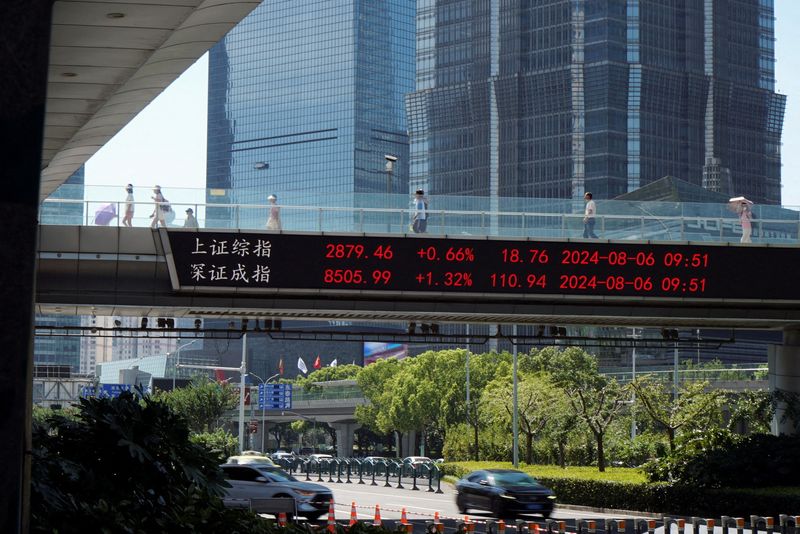Stocks flat, longer-dated Treasury yields climb after CPI data, Fed comments
By Chuck Mikolajczak
NEW YORK (Reuters) -Global stocks were little changed while longer-dated U.S. Treasury yields edged up in choppy trading on Thursday as investors weighed the interest rate path from the Federal Reserve after economic data and comments from central bank officials.
U.S. consumer prices rose slightly more than expected in September as food costs rose, but the annual increase in inflation was the smallest in more than 3-1/2 years. The Labor Department said the consumer price index increased 0.2% last month after gaining 0.2% in August, slightly above expectations of economists polled by Reuters for a 0.1% rise.
In the 12 months through September, the CPI rose 2.4% versus the 2.3% estimate.
"It's a little bit hotter than expected, the top line and the core level, and is a bit of a disappointment for those that were hoping for rate cuts coming at successive meetings," said Robert Pavlik, senior portfolio manager at Dakota Wealth in Fairfield, Connecticut. "People are thinking the Fed is now going to be concerned about the level of inflation.
"It's kind of a kick in the shins."
Other data showed weekly initial jobless claims jumped 33,000 last week to a seasonally adjusted 258,000, well above the 230,000 estimate, although the climb was partially attributed to distortions from Hurricane Helene.
The data helped initially solidify expectations the Federal Reserve will cut interest rates next month, but expectations retreated slightly to a nearly 80% chance for a cut of 25 basis points (bps) after comments from several Federal Reserve officials, from nearly 90% immediately after the numbers were released, according to CME's FedWatch Tool. Expectations for the 25 bp cut then increased again and were last at 86.3%.
Atlanta Federal Reserve Bank President Raphael Bostic said in an interview with the Wall Street Journal that he would be "totally comfortable" skipping an interest-rate cut at an upcoming meeting of the U.S. central bank, adding that the "choppiness" in recent data on inflation and employment may warrant leaving rates on hold in November.
The market had been pricing in a 32.1% chance for another outsized cut of 50 bps a week ago.
On Wall Street, stocks ended lower but off their worst levels of the session, with the rate-sensitive real estate index the worst-performing of the 11 major S&P sectors.
The Dow Jones Industrial Average fell 57.88 points, or 0.14%, to 42,454.12, the S&P 500 fell 11.99 points, or 0.21%, to 5,780.05, and the Nasdaq Composite fell 9.57 points, or 0.05%, to 18,282.05.
MSCI's gauge of stocks across the globe slipped 0.18 point, or 0.02%, to 848.46, as it pared earlier declines. In Europe, the STOXX 600 index closed down 0.18% ahead of France's 2025 budget.
Markets have been dialing back expectations the Fed will be aggressive in cutting interest rates after Friday's strong U.S. payrolls report. Fed Chair Jerome Powell and other central bank officials have signaled the Fed has shifted its primary focus from combating inflation to labor market stability.
Other Fed officials indicated on Thursday that slowly cooling inflation and a U.S. job market that remains strong but at risk of deteriorating give the central bank room for more interest-rate cuts in coming months, likely at a gradual pace.
The yield on benchmark U.S. 10-year notes inched up 0.4 basis point to 4.071% after reaching 4.12%, while the 2-year note yield, which typically moves in step with interest rate expectations, fell 5.6 basis points to 3.962%.
The dollar index fell 0.03% to 102.85 after earlier rising as much as 0.27%, with the euro down 0.03% at $1.0936.
Against the Japanese yen, the dollar weakened 0.51% to 148.53. Bank of Japan Deputy Governor Ryozo Himino said on Thursday the central bank will consider raising interest rates if the board has "greater confidence" that its economic and price forecasts will be realized.
Sterling weakened 0.07% to $1.3061.
Oil prices jumped after two sessions of decline, boosted by a spike in fuel demand as Hurricane Milton slammed into Florida, with Middle East supply risks and signs that demand from the U.S. and China could increase also providing support.
U.S. crude settled up 3.56% to $75.85 a barrel and Brent rose to settle at $79.40 per barrel, up 3.68% on the day.
Source: Investing.com
